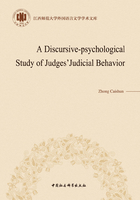
Chapter 1 Introduction
1.1 Background to the Study
Since the late 1970s,a comprehensive program for judicial reform has been implemented in the Chinese judicial system with a view to accommodating the political philosophy of “rule of law” .It is claimed that the establishment of a new judicature in China has been marked by 13 major judicial and political events(Shen 2004).Among them,the formulation and enactment of the three procedure laws[1]are the most remarkable accomplishments,and thereby new procedures of trial have been prescribed,the roles of judges,litigants and other participants in courtroom trial have been redefined and the rules governing evidence determination and judicial decision making have been reformulated.Within this endeavor,there seems to be a propensity to capitalize on the strengths of both the Common Law and the Civil Law traditions,which is manifested in the existence of some hybridity in the current Chinese judicial system.However,this reform is a complex social project that can not be achieved at a strike.So far,reform experiments are still going on at different levels of judicature.The following quotation represents a critical view about current reform of Chinese judicature:
Much evidence has shown that the judicial reform in China has not been effective in enhancing public confidence in courts and judges and promoting judicial independence,as was expected by the decision-makers,but on the contrary,has aggravated in certain aspects the existing problems,and even brought about new ones.
(He,2002:17)
Apart from the criticism that has been leveled at current Chinese judicial system,constructive suggestions have also been proposed as to what and how to reform.Xiao Yang(2002),the former Chief Justice of China,points out that there are three major problems to address:the localization of judicial power,the bureaucratization of judicial institution management,and the under-professionalization of judges.These problems all have much to do with the role of judges.In this vein,there has emerged a strong call for respecification of judge's identity(Qu,2006;Tian,2013;Yang,2014;Yu,2012).Research that resonates with the call has canvassed judges' independence(Zhang,1999),professionalization(Lin,2006),qualification(Qu,1999),Knowledge(Cai,2003),selection and appointment(Xia,2001),etc.As a result,laws and regulations(e.g.the evidence rules,Civil Procedure Law,Criminal Procedure Law,etc.)have been formulated to regulate judges' judicial behavior.
However,the empirical evidence has shown that judges' professional performance can not be berigorously monitored by existent legal rules or codes of conducts.The process of judges' judicial decision making is far more complex than what procedure laws or judicial codes can capture.This is well illustrated in sentencing disparity.It is quite common that different judges may arrive at different judicial decisions on the same case.This suggests that rules and codes can not predict judicial behavior and judicial justice can not be guaranteed merely by law alone.The legal realists argue that law is drafted and exploited by human beings and is,thus,subject to human foibles,frailties and imperfections.In this light,the study of law shall pay closer attention to the nature of judges' judicial behavior(JJB)in order to explicate how justice is enacted and lived out in judicial process.
However,research into JJB is still in its infancy in China(e.g.Su,2004;Wu,2008;Li,2013;Xu,2012;Zhang,2014).The existent literature is mostly concerned with the putative norms of judges' judicial behavior.Quite few empirical studies have examined the actual behavior of judges.
In the western scholarship,judicial behavior has been an important research topic in political science in the past few decades(Schubert and Danelski,1969;Gibson,1983;Baum,1997;Baum,2006;Klein & Mitchell,2010).Efforts have particularly been made to address judges' discretion in sentencing(Thomas,2003)by modelling their judicial decision making(Lovegrove,1989)or documenting the affecting variables.For example,in researching juvenile court sentencing,Sanborn(1996)identifies three types of variables:
(1)legal-severity of offense and previous record,
(2)administrative-particular court or judge,and
(3)social-race,class,gender,and age.
These variables have also been drawn on to account for JJB in other types of case(e.g.Pratt,1998;Steffensmeier and Britt,2001;Manning and Carroll et al.,2004;Becker-Lindow,2007;Staley,2007;Wu,2007).However,no consistent results have been pooled so far.For example,in St.Louis's(2000)research of juvenile court judges,the assumed correlation between the potential variables and the judicial decisions is rejected by the statistical result of empirical data.This indicates that those specified variables are not always reliable predictors for JJB.The conflicting results from academic research also suggest that a critical re-evaluation is essential to justify a theoretical account of JJB.
Among the existent research,a rational model is assumed by many people regardless of whatever variables they are concerned with.This model is driven by a prescriptive interest,aiming for a unified account of judicial practice(Wu 2008).However,such a model has its inherent limitation as is manifested in the inconsistency or disparity of JJB.It fails to address how judges deal with contingencies.
Moreover,previous judicial behavior studies have used limited empirical data to extract variables that underpin judges' decision-making.Theorization about judicial behavior is made “without ever setting foot in a trial court or encountering a trial court judge face to face”(Philips,1998:xi).They do not rely on “data based on direct observation of judicial behavior(Tate,1983:62)but on given written documents or surveys.In other words,the existent judicial behavior theories are putative in nature.They do not reflect the real situation in which JJB occurs.
In short,previous studies of JJB provide only a limited or partial insight into the ways judges figure in the judicial process.In the milieu of China's judicial reform,JJB has become a perplexing issue for judges who need to find orientation in their professional life and for policy makers who need to steer the direction for legal and judicial development.Therefore,further exploration into JJB will be of apparent practical and theoretical significance.